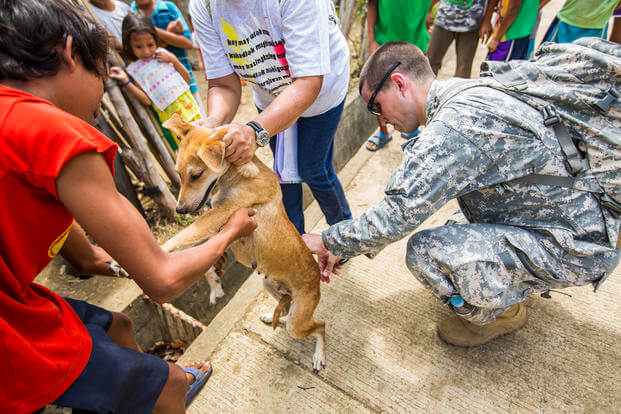Rabies is a deadly virus for which there is no cure, killing an estimated 60,000 people per year around the globe.
But researchers at the Uniformed Services University of the Health Sciences have discovered a way to neutralize the virus in mice -- a breakthrough that could lead to a potential treatment for humans who have contracted the disease.
Currently, anyone who is bitten by a rabid animal has a short window to get a vaccine to prevent the virus from invading the central nervous system. Once that happens and symptoms appear, the disease is nearly always fatal.
Read Next: Marines Begin Training in the Philippines as South China Sea Tensions Seethe
The challenge in finding a cure has been that the type of virus that causes it, a lyssavirus, spreads through the central nervous system to infect the brain, which is protected by a blood-brain barrier that prevents most medications from reaching it.
The rabies virus seems to strengthen this barrier further, thwarting any potential treatments once the virus has invaded.
The researchers appear to have found a way to sidestep the barrier using the body’s own immune system. The team, led by Brian Schaefer and Christopher Broder, professors at USUHS' Department of Microbiology and Immunology, injected mice infected with rabies with a monoclonal antibody derived from a virus similar to rabies known as an Australian bat lyssavirus.
The single dose reversed signs of disease, even after symptoms had appeared, and it prevented death.
According to Schaefer, the team thought the antibody would block the infection at the early stages but had no idea what would happen once the virus replicated.
"All the untreated animals died. But of the animals treated on Day 5 and Day 7, all six treated on Day 5 survived and 5 out of 6 of the Day 7 animals survived -- those were the ones that were really surprising, because the virus already was replicating strongly in them," Schaefer said in an interview with Military.com.
Months later, the mice still have the rabies virus in their bodies, but their viral loads are so low they are nearly undetectable, according to Schaefer.
"It's like there's a stalemate between the virus and the host's immune response. The immune response keeps the virus from expanding, but for whatever reason, it can't completely get rid of whatever little reservoir is left," Schaefer said.
While monoclonal antibodies can't typically cross the blood-brain barrier, the researchers found that the one they developed addressed the rabies infection that had established itself in the spinal cord by changing an immune cell in the brains of the infected mice.
Even though the antibody was blocked from entering the brain, it influenced the immune cell to neutralize the virus.
Schaefer said the initial goal of the team's research, published Sept. 28 -- World Rabies Day -- in the journal EMBO Molecular Medicine, was to develop a therapy to treat lethal viral infections of the central nervous system such as Nipah, a virus common in Southeast Asia; the Hendra virus in Australia; and rabies.
Cases of human rabies in the U.S. are rare, with roughly one to three cases reported annually, according to the Centers for Disease Control and Prevention. However, between 30,000 and 60,000 Americans receive the rabies vaccine each year as a preventative following an animal bite.
In the last 50 years, just one U.S. service member is believed to have died from rabies. Army Spc. Kevin Shumaker died Aug. 31, 2011, in Syracuse, New York, three months after he returned from a deployment to Afghanistan.
Shumaker was bitten after trying to break up a fight between two dogs on deployment. His parents filed a negligence complaint saying their son was not given the full course of a rabies vaccine following the bite, although Army officials said the soldier did not seek medical care following the bite, according to news reports at the time.
From 2011 to 2018, 22,729 active-duty and reserve troops reported animal bites, including 899 during overseas deployments, where the risk of being bitten by an unvaccinated dog or animal is significantly higher than in the U.S.
Schaefer said that the next step for his own research is to determine how the monoclonal antibody affected the immune cells that helped neutralize the virus. But, he added, he would like to see clinical trials on the potential treatment for rabies in places where the virus is a threat to humans.
"This should be given to the scientific and medical communities, and hopefully the government of one of these countries where they have so many deaths could put a little money behind it and try to treat some of the people that have contracted rabies," Schaefer said.
A recent study found that vaccine hesitancy, which increased during the COVID-19 pandemic, is spreading to pet owners: The survey found that nearly 37% of dog owners felt that canine vaccines were unsafe.
Schaefer said immunizations are the only reason the U.S. doesn't have the same death rate from rabies as developing countries.
"Stop vaccinating your dogs and rabies will come back really quickly. We haven't completely gotten rid of rabies. There's still rabies in racoons and foxes and bats, and it's a very, very successful virus that can infect most mammals," Schaefer said.
– Patricia Kime can be reached at Patricia.Kime@Military.com.
Related: Pentagon OKs COVID-19 Vaccine that May Ease Some Religious Objections











